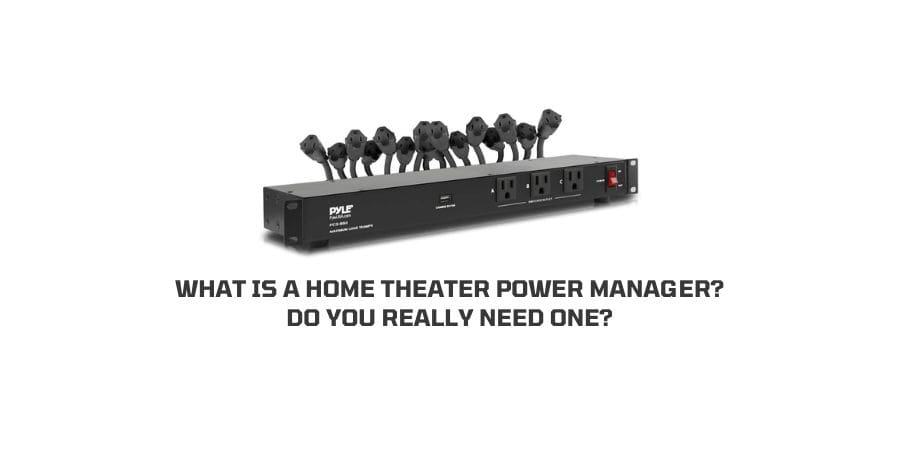
Since you are here, reading the following article on, “What is a Home Theater Power Manager? And do you really need one?”.
My guess is that you already have a home theater at your home or work place and want to improve the experience even further. Good news for you because the very first step in doing so is right here.
The very first step to elevate your home theater experience as well as to keep it safe and sound from getting damaged without a doubt would be a Power Manager for your Home Theater.
There are quite a few names for this single device. Names like Power Stabilizer or even Power conditioner can be used interchangeably with each other for this single device.
Be it any name you want to call such a device. In the end it all boils down to one single purpose which is to enhance the audio experience of your Home Theater device as well as keep it safe from any kind of damage, which might be caused due to a power surge or short circuit of some kind or the other.
And thus, just to get all your doubts cleared as well as your queries answered, without wasting anymore of your precious time let us head on with the following article.
Here you can expect to find almost everything related to a Home Theater Power Manger, from what it actually is to why it is needed to whether you actually need one at home.
We shall try to look into as well as cover it all. Everything you need to come to a more definitive conclusion when it comes to Home Theater Power Manager and everything related to it.
What Is Home Theater Power Manager?
For those of you who have absolutely no idea of What a Home Theater Power Manager is or what it does. This section should be able to help you find out just that and understand its purpose a little better.
So in the simplest of terms, a Home Theater Power Manager is basically a device which primarily can be used to manage as well as maintain power supply to the various equipment attached to it and at the same time keep them safe from any kind of external factors such as a power surge or even a short circuit that might happen within the set-up itself.
The device more or less looks like a typical set-up box with a number of outlets as well as dials to help control various input and output operations from as well as to the different devices connected to it.
In addition to that, a power manager also helps to greatly reduce as well as cancel out unwanted noise, responsible for spoiling your audio experience.
And depending, upon the type of Power Managers you are going for and the brand you are choosing, there might be other additional features and functions as well to make life for you a bit more simpler and easier.
The costlier and more high-end the device you opt for the better the features as well as the results.
All this is good. However, just because it is good for your device does not really answer the question, whether purchasing the device is actually necessary or not. The answer to which you should be able to find in the section mentioned below.
Why is a Home Theater Power Manager Important?
This section is quite important, if you are unsure about whether going for a Home Theater Power Manager for your equipment is a good idea or not.
Obviously, given the extra bucks you will need to spend on such a device. The more information and data you have with you related to it, the better your chances to come to a decision that would prove best for you..
And hence, without any further ado, let us have a look at some of the main reasons why a Home Theater might be important in the first place.
1. Enables you to manage multiple equipments and devices on a single platform
If you want to control and easily manage multiple equipment with the help of a single device. Then, a high-end and feature rich power manager should help you do just that.
Given that, most good quality home theater power managers come equipped with multiple outlets as well as dials and switches to maintain voltage and power output to various devices all over a single platform, making it really easy for a user to be able to attain the type of excellent results he or she is looking for.
2. Offers Surge Protection
As has already been said multiple times, one of the very primary and basic functions of a power manager is to protect devices connected to it from any kind of power surge or short circuits.
With a power manager, damage which may be caused due to abrupt fluctuations in voltage may be prevented quite easily and efficiently, keeping devices connected to it safe at all times whether in use or not.
3. Offers Noise Protection
The other main feature which comes with almost all types of power managers out there would be the ability to cancel out unwanted noise.
Noises are actually quite common and may be present in audios being played without you even noticing it many times. Now, obviously for many it might not seem like a very big deal.
However, for professionals or people who really enjoy music or so and need the best experience, even the slightest sense of disturbance caused by noise may be quite disappointing.
Noises can be caused due to a number of reasons like radio waves, weather disturbances, electromagnetic wave frequencies, AC to DC conversion and electric fluctuations, just to name a few.
And thus, in order to manage all that and cancel out noise being caused by any such factors. Having a good quality home theater power manager can help do wonders.
4. Works as Automatic Voltage and Power Regulator
When having a dozen of different devices connected to each other all at once, managing the voltage supply to each one of them separately can prove to be quite hectic and overwhelming.
Hence, at times like this having a power manager device which can automatically manage voltage and power supply to the various devices connected to it can prove to be of great help and make your life much simpler.
Do I really need a Home Theater Power Manager?
Well, here you have to understand two things very clearly.
One, that today most modern devices and equipment out there come with their own very power regulators as well as noise cancellation circuits.
If you have purchased a high-end home theater for yourself. Then there is a high chance, it comes equipped with very good voltage regulators and noise cancellation circuits pre-built inside.
Secondly, when talking about damage caused by power surges and short circuits. Then, there are only a few modern houses today which don’t have a quick and responsive circuit breaker installed in them.
If your house falls under those few without a good circuit breaker safety device, then and only then a Power Manager might benefit you.
Otherwise, your home circuit breaker and a well set-up earthing, should be enough to keep your devices safe and sound.
Conclusion
In the end it is all about how much you are willing to spend or how much you are capable of spending.
If you already have a good home theater and good safety devices installed at your home from the very beginning. Then, spending more on a home theater might not prove to be the best ideal option.
However, if you are someone like a sound engineer and just cannot compromise on the quality of output that your home theater has to offer. Then, investing a few extra bucks on a power manager might not be such a bad idea after all.
Hence, depending upon your needs and requirements as well as your budget, you can very well come with a decision that is suitable for you as well as your home theater unit.
Like This Post? Checkout More
